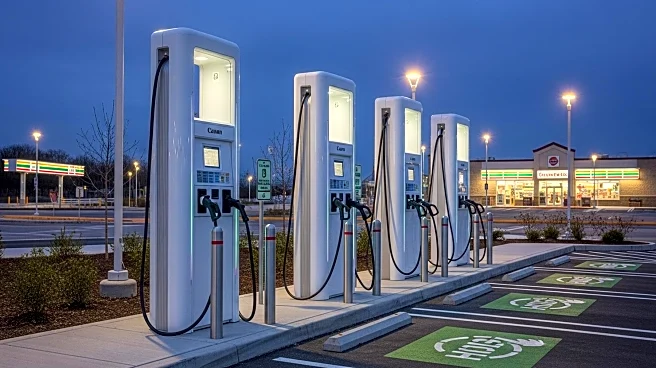What's Happening?
The National Association of Truck Stop Operators (NATSO), the Society of Independent Gasoline Marketers of America (SIGMA), and the National Association of Convenience Stores (NACS) are opposing the Recharge Act, a legislative proposal introduced by Senator Jeff Merkley. The bill aims to allow electric vehicle (EV) charging stations at public interstate rest areas. These associations argue that the proposal threatens private investment in EV charging infrastructure by undermining a federal law that prohibits the sale of fuel and other services at rest areas. They claim that this law has historically promoted business development at off-highway exits, encouraging investment in truck stops, travel centers, and convenience stores. The associations believe that allowing EV chargers at state-operated rest areas would unfairly favor government-run locations, which do not face the same market pressures as private businesses.
Why It's Important?
The opposition to the Recharge Act highlights a significant debate over the future of EV infrastructure in the U.S. The outcome of this legislative proposal could have substantial implications for the development of a national EV charging network. If the bill passes, it could shift the competitive landscape, potentially disadvantaging private businesses that have already invested in charging infrastructure near highway exits. This could impact the growth and reliability of the EV charging network, as private sector involvement is seen as crucial for widespread adoption. The debate also underscores the tension between public and private sector roles in infrastructure development, with potential consequences for consumer choice and market dynamics.
What's Next?
The Recharge Act is currently under consideration, and its progress will be closely watched by stakeholders in the EV and fuel retail industries. If the bill advances, it may prompt further lobbying efforts from both supporters and opponents. The U.S. Department of Transportation's recent guidance on the National Electric Vehicle Infrastructure program, which supports private investment in EV charging, may also influence the legislative process. As discussions continue, lawmakers will need to balance the interests of public infrastructure development with the need to foster a competitive market environment.









